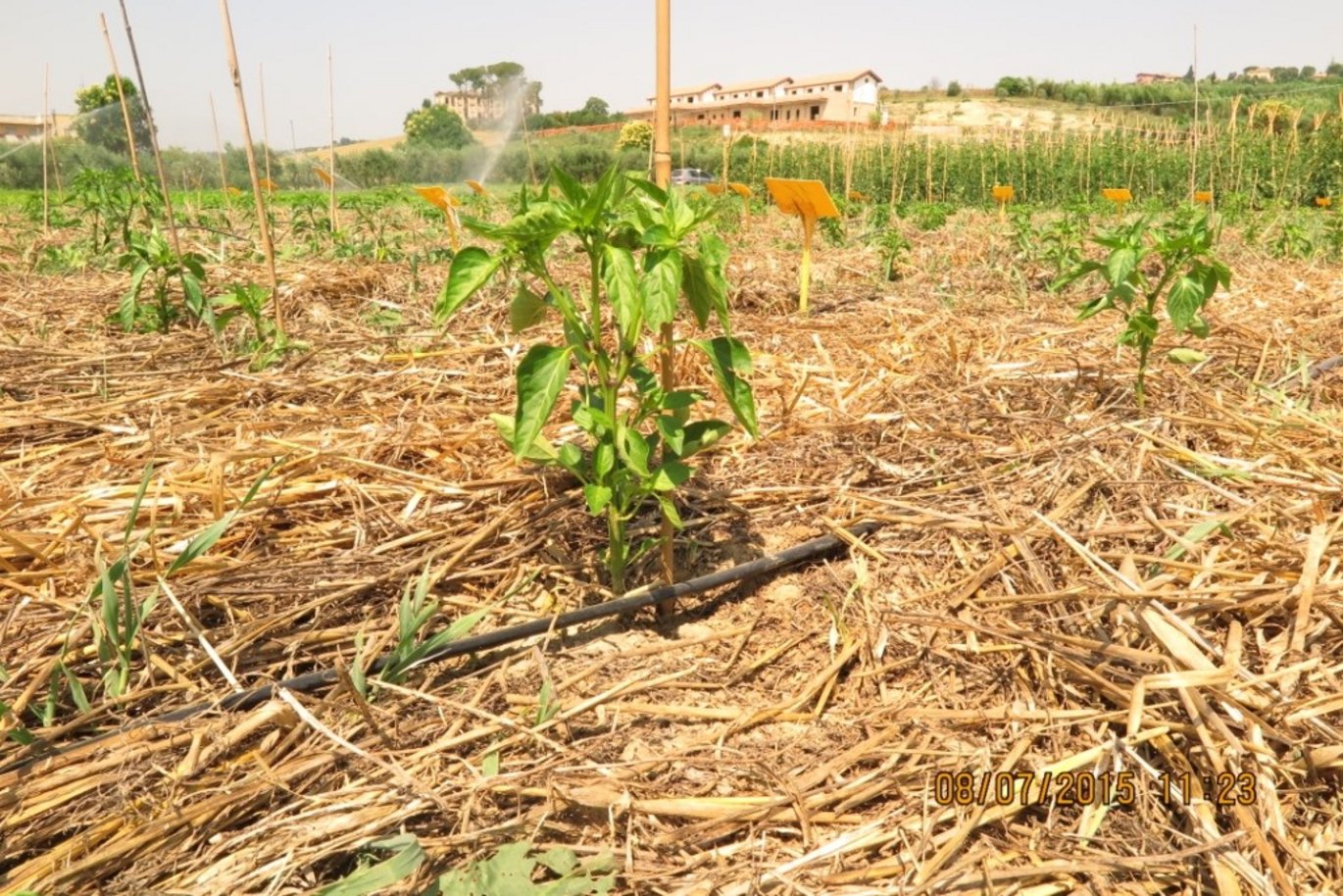Beyond SoilVeg: Identifying the potential for no-till systems
The SoilVeg project found that no-till practices can have a greater environmental benefit than green manure application in organic cropping systems for vegetable production. On the other hand, no-till resulted in lower yields compared to green manure treatments. However, the project also identified several important topics for further research, which could add to the SoilVeg results and provide a more nuanced picture concerning no-till yields.

SoilVeg (Improving soil conservation and resource use in organic cropping systems for vegetable production) aimed to improve soil quality and enhance resource use in organically managed systems for vegetable production by introducing the no-till technique. The project, which was completed in 2018, found that no-till practices have a greater overall environmental benefit than green manure, scoring higher on environment-related indicators such as fossil fuel energy savings, loss of nutrients and overall biodiversity.

| Figure 1: Comparison of results for Business As Usual (BAU) and SoilVeg according to a variety of indicators. The BAU system used ASC as green manure and SoilVeg system utilized the roller crimper in a no till management system. Canali, 2018 |
|---|
However, it also resulted in lower yields and lower quality.
The yield gap is approximately 25-35% and may result from a variety of sources, such as:
- Soil compaction, limiting root growth and, consequently, nutrient and water intake
- Nitrogen shortages
- Constraints due to machinery design and settings
The SoilVeg project took an important first step toward understanding the impacts of the no-till system and identified various questions that have not yet been addressed, which could provide a more nuanced picture concerning no-till yields. These knowledge gaps and research needs can be clustered into four groups:
Cluster 1: Best varieties of agro-ecological service crops for no-till systems
The SoilVeg project identified three key factors that result in the best conditions for no-till systems:
Biomass production: In order to achieve the best results, four to five tons of biomass per hectare of dry matter are needed. With less than that, green manure may be a better solution than no-till.
Sowing density: One of the most important factors that affect the amount of biomass produced is sowing density, which varies significantly depending on several environmental factors, making it difficult to identify the proper one. While over-seeding by about 25-30% usually guarantees the desired biomass production, this represents an additional cost for the farmers.
Attitude to be flatted: the ease with which the crop can be flattened and the tendency it has to regrow can also influence the effectiveness of the agro-ecological service crops (ASC) in no-till systems. This varies, even among cultivars of the same species.
Research needs: screening to identify ASC species that produce enough biomass and have an attitude to be flattened.
Cluster 2: Cash crop planting strategies and breeding to mitigate yield gap
The SoilVeg project compared different management variants (no treatment, green manure and no-till) without changing the planting densities and planting layouts of the cash crops. In many cases, farmers could increase the cash crop density and, in turn, increase their yield.
Furthermore, most vegetable cash crops are bread for optimal growth in tilled conditions. However, breeding for tilled conditions focuses on different traits than are desired for no-till conditions. For example, cash crops with a strong rooting system will likely perform better under no-till conditions. However, little research has focused on the rooting system since it is of less importance in tilled and intensively fertilised systems.
Research needs: identify optimal planting densities/layouts as well as new traits. Design new breeding programs tailored for no-till.
Cluster 3: Machinery design
While the roller-crimper technology is relatively simple, some elements, such as the shape of the blades or the weight of the roller, need to be carefully designed. Despite the wealth of knowledge on the subject, it is still not fully widespread in Europe.
Similarly, the no-till transplanter needs design improvements and would often have to be adapted to specific regional conditions (e.g., soil characteristics, soil types and textures, or cover crops).
Research needs: improve machinery design and disseminate existing knowledge
Chapter 4: detailed performance assessment
The assessment conducted by SoilVeg indicates that the no-till system performs better than other systems in terms of most environmental indicators, but does not perform as well in terms of yield gap. However, a more detailed performance assessment and more thorough assessment indicators could provide more nuanced results.
For example, while it is unlikely that no-till systems will achieve the same yield as classical tilled systems, they may perform as well in terms of gross margin for the farmer. In other words, lowers costs associated with a no-till system may compensate reduced yield in some cases. Similarly, there has still been little research to test the long-term impacts of no-till systems. Long-term studies or, at the very least, studies on farms that have implemented organic practices for a long time, would be required to better understand the processes associated with no-till systems.
Furthermore, while social indicators were outside the scope of the SoilVeg project, studying the social impacts could identify additional benefits for farmers. For example, based on cursory observations, no-till could reduce farmer dependency on external inputs or services. No-till and roller crimper techniques could also be effectively implemented on small farms.
Research needs: More detailed indicators and assessments, especially regarding gross margins and social indicators.
Contact information:
Stefano Canali
Consiglio per la ricerca in agricoltura e l'analisi dell'economia agraria (CREA)
Centro di ricerca Agricoltura e Ambiente – Research centre for Agriculture and Environment (AA)
Via della Navicella 2-4, 00184 Roma (IT)
Tel. +39-06-7005413; extension 242
Email: stefano.canali@crea.gov.it